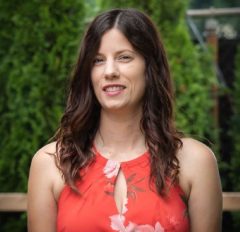Many congratulations to Kerry O’Neill on the successful defence of her Ph.D. in Ethics and Public Affairs on August 9, 2021.

Kerry joined the Ethics and Public Affairs program at Carleton University in the Fall of 2016, after completing a BA (Hons) in Philosophy and Peace Studies and an MA in Philosophy at McMaster University (in combination with a Water Without Borders diploma from united Nations University – Institute for Water, Environment and Health). Her MA thesis was on the human right to safe drinking water and provided an assessment of real-coast water pricing and other policies, such as the Millennium Development Goals and Sustainable Development Goals, intended to fulfill this right.
We asked Kerry to reflect on her time in the EPAF Ph.D. program, and here’s what she had to say:
What did your thesis/research include?
Like my MA thesis, my doctoral project was located at the intersection of philosophy and public policy. I assessed the extent to which conditional cash transfers (CCTs) might be useful in achieving the goals of ending poverty for all and achieving gender equality and women’s empowerment as outlined in the UN Sustainable Development Goals. I argued CCTs cannot and do not satisfy both goals, but rather attempt to combat some forms of poverty at the expense of women and girls. What’s especially troubling about CCTs is that the programs require women to comply with activities that reinforce unjust gender norms and punish women for failing to comply with the patriarchally prescribed behaviours mandated by the state, and that through these programs the state also exploits beneficiary women.
What did you like most about your time in the EPAF Ph.D. program?
I was drawn to the EPAF program because of its interdisciplinary nature. Coming from a philosophy background it can be easy to get caught up in the normative debates without thinking through the practical and policy implications that theory has. The training I received from the program (in terms of classes and co-curriculars) proved invaluable and made me a better researcher and teacher. The supervision and support I received for my doctoral work were phenomenal and I could not have been happier to be a part of the EPAF community.
What did you like most about your time at Carleton in general?
The tunnel system! Who wants to walk across campus in the winter? More seriously, Carleton is a fantastic university and provides numerous opportunities for students who wish to be connected to academia or the government. There are always conferences, workshops, and guest speakers to attend, and the students are bright and engaging to work with.
What is something you wish you knew coming into your first year of the program?
Completing a Ph.D. is a marathon not a sprint – pace yourself. And network, network, network.
What can we find you doing now?
Teaching philosophy and public policy to undergraduates! I am an instructor at Carleton University where I teach in the Philosophy and Public Affairs and Policy Management programs. I also teach in the Policy, Philosophy, and Economics stream in the Trinity One program at Trinity College (University of Toronto).
Carleton’s graduate Ethics and Public Affairs (EPAF) programs were founded in 2015, and combine ethical analysis with social science to gain a comprehensive understanding of the options for solving particular public issues. Possible research topics are as varied as the expertise of Carleton faculty, ranging from the environment, gender and other social inequalities, multiculturalism, health, social and economic development, global inequality, and more. The program is not so much ‘applied ethics’ as it is a collaboration between philosophers who research public issues and social science and public policy specialists with interests and expertise in the values underlying those issues.
Visit our page, Student Profiles, to learn more about other Ph.D. students in EPAF.